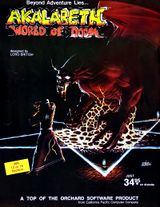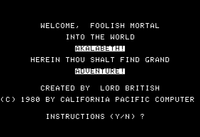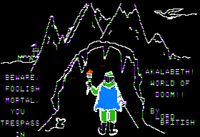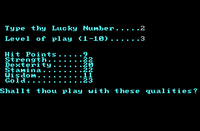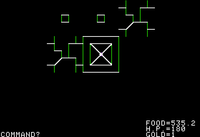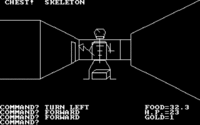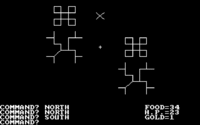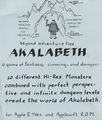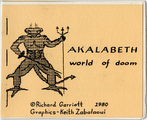Akalabeth
Akalabeth: World of Doom, also known as Ultima 0: Akalabeth, is the first game in the Ultima series. It was created by Richard Garriott in 1979 and released commercially in 1980 for the Apple II.[1]
Gameplay[edit]
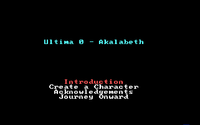
Akalabeth was intended to be a computerized re-creation of the Dungeons & Dragons games Richard Garriott had enjoyed with his friends throughout high school. The game begins with the all-capitals proclamation:
- "Welcome peasant into the halls of the mighty Lord British. Herein you may choose to dare battle with the evil creatures of the depths, for great reward!"
The player is then asked for a name and "lucky number", which is used to generate the terrain and attributes; mages can control magic amulets, while fighters can use any weapon. The map uses lines to indicate impassable mountains, Lord British's Castle, dungeons, and towns, supplemented by simple text descriptions similar to the ones seen in the early Ultima games. Holes also exist on the map, but no outline is present to warn travelers.
The objective of the game is to become a knight by venturing into the dungeons and killing the ten increasingly difficult monsters specified by Lord British. He increases all attributes by one point when visited directly before and after each quest; hit points are increased by killing monsters and entering or leaving dungeons.
Food and weapons may be purchased in towns with the gold won by killing monsters or found in chests. Every step on the map and every few steps in a dungeon use one food, gremlins steal half of one's food with each attack, and running out is instant death. Likewise, buying more than one of a preferred weapon is wise, as thieves in the dungeons steal them right out of the player's hands.
Dungeons are drawn in the first-person perspective using wireframes that change colors with each of the infinite levels. Every time the player ascends or descends within the dungeon, the chests and monsters are reset, which makes gathering gold for adequate amounts of food and weapons more feasible.
The one non-weapon item in Akalabeth is the magic amulet, which can be used in dungeons to ascend or descend a level, shoot a missile, or cast a Transformation spell. Fighters can use an amulet, but only mages can control which of the four effects results.
At the very end of Akalabeth, the player is informed as proven worthy of knighthood and told to call California Pacific Computer to report the success. Play continues, but the inability to save one's game and permanent death usually act as built-in limits unless the individual is cheating.
Plot[edit]
From the manual:
"'Tis said that long ago peace and tranquility covered the lands, food and drink flowed freely, man and beast lived in peace, gold and silver abounded -- it was the Golden Age of Akalabeth.
Mondain, second born of Wolfgang, a great king of old, wished to gain his brother's inheritance, and so he used his great powers for evil. Many years had Mondain traversed the lands of Akalabeth spreading evil and death as he passed. He created deep dungeons, so deep and extensive that their lower depths had never been explored. In these dungeons he unleashed more evil. He sent thieves, skeletons and snakes to dwell near the surface, and Daemons and balrogs to guard the depths. Now blood flowed freely in Akalabeth, and foul creatures soon came to roam near the surface. Mondain cast such sickness and pestilence upon Akalabeth, that both man and beast lived in constant fear. Thus was the Dark Age of Akalabeth.
There arose from the land a man, pure and just, to battle the Dark Lord. British, Champion of the White Light, did battle with Mondain deep within the labyrinth of dungeons, eventually driving him from Akalabeth forever. British of the White Light was proclaimed Lord British, Protector of Akalabeth. Alas, much damage had been suffered unto the lands. The Revival of Akalabeth has begun.
'Tis thy duty to rid Akalabeth of the foul creatures which infest it whilst trying to stay alive!"
In the game, the player character visits Lord British and is instructed by him to kill certain monsters. The final mission is to kill a balrog (spelled differently from balron, which appear in later games), and after this has been accomplished, Lord British proclaims that "thou hast proven thyself worthy of knighthood" and the game ends.
The series was later retconned so that Mondain attacks Sosaria for the first time in this game, but the player's efforts deflect his attack, making him frustrated and finally leading to the events of Ultima I.
Development[edit]
Akalabeth was a free-time project of Richard Garriott, originally known as D&D28 since it was his 28th game inspired by Dungeons & Dragons. He wrote it in 1979 when he was finishing high school. It was coded using BASIC, and most of it was written on punched tapes fed into the school's PDP-11 computer, using a teletype as the output to print the game screen as it changed.[1][2]
Some months later, Garriott ported this code to an Apple II computer, renaming it D&D28b. This version added dungeons in 3D, from a first person perspective, which were not present in the original D&D28 teletype version. Garriott got the idea for this type of dungeons from the maze game Escape!.[2]
Both versions of the game have only black and white graphics and no sound.
Release[edit]
Even though Akalabeth was Garriott's 28th game, it was the first one sold commercially. While Richard Garriott was employed at Computerland in the summer of 1980, the store owner saw commercial potential in D&D28b and prompted Garriott to publish the game himself. Garriott renamed it Akalabeth and made copies of the game disk at home. He numbered them and packaged each along with a manual and cover sheet in a Ziploc bag. They were then put for sale in the same store Garriott was working in. Around a dozen copies were sold; Garriott kept the remaining ones.
One of the copies was seen by publisher California Pacific Computer Co., which worked out a deal to publish Akalabeth, giving Richard Garriott $5 for each copy that was sold. The game was released in late 1980,[1] and had hand-drawn orange castle as the cover art and came with a large 4-page booklet. In 1981, it was re-released with a smaller 8-page manual and using Denis Loubet's "Wrong Number" for the cover and advertisements. The game ended up selling 30,000 copies in total, earning Garriott $150,000.[1] It was voted one of the top 30 games by Softalk Magazine from 1980 to 1981.
Included with the game[edit]
Reception[edit]
Upon its original release, Akalabeth received positive reception. In The Space Gamer issue 36, Steve Jackson stated "On the whole, I recommend Akalabeth highly", praising the graphics of the game for being better than other games at the time, and also praising the gameplay[3].
Versions and ports[edit]
As the game was only released on Apple II back in 1979, it remained mostly unknown from PC players as no version of the game existed for that platform. In 1996, a fan called Finire Dragon made a port of the original game for the PC, dubbing it for the first time Ultima 0, which was distributed over the Internet.
It would only be in 1998 that an official PC version of Akalabeth was released as an enhanced remake, included in the Ultima Collection. It featured MIDI music from Ultima III, a new menu screen and a limited amount of color added to the graphics. This version adds a save and restore game feature, which was completely missing from the original. It also contains an updated digital manual. Just like the unofficial port, it was also officially dubbed Ultima 0: Akalabeth.
There also exists a port of the game for the iPhone, Akalabeth for iPhone, and another one in Java ME for mobile devices.
[edit]
- For spells in this game, see Akalabeth spells.
- For easter eggs and real-life references in this game, see Akalabeth easter eggs and cultural references.
Gallery[edit]
External Links[edit]
- The Collectable ULTIMA
- Akalabeth – Details on Akalabeth releases (archived version, 2008-03-16)
- Akalabeth – Ultima Aiera – Akalabeth resources
- Akalabeth: World of Doom (Wikipedia)
- Akalabeth: World of Doom – Apple II (YouTube)
References[edit]
- ↑ 1.0 1.1 1.2 1.3 Maher, Jimmy and Garriott, Richard. “A Word on Akalabeth and Chronology”. The Digital Antiquarium. 2011-12-02. Retrieved 2013-05-15.
- ↑ 2.0 2.1 Maher, Jimmy. “Lord British”. The Digital Antiquarium. 2011-12-12. Retrieved 2013-05-15.
- ↑ Jackson, Steve (February 1981). "Featured Review: Akalabeth". The Space Gamer. Steve Jackson Games (36): 10–11.
